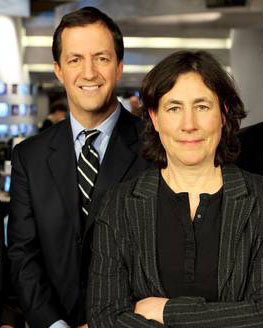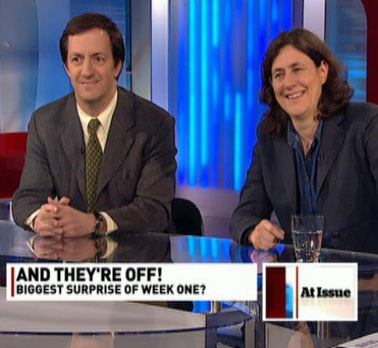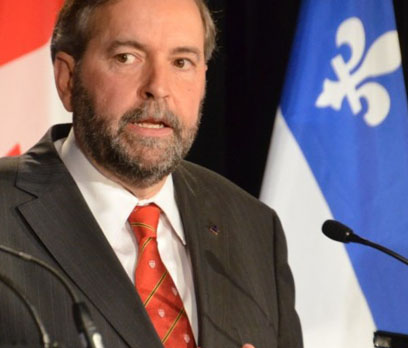Coalition dreaming in Ottawa 2015 … still crazy after all these years ??
Dec 17th, 2014 | By Randall White | Category: In BriefFor Canadian federal politics 2015 is bound to be a crucial year. And two recent comment pieces by Andrew Coyne and Chantal Hébert make for rather ominous reading, as the start of the year comes into clear view.
Both Mr Coyne and Ms H̩bert are worrying about just what may or may not happen if Рas seems likely enough on many recent opinion polls Рthe final result of the 2015 federal election (probably on October 19, as currently prescribed by law?) proves to be one or another form of minority government.
Andrew Coyne is, with good reason, I think, most worried about the current vagueness of our Canadian political culture on the ultimate “constitutional” rules of the game for minority parliaments, so to speak.
The seven long years of minority government in Ottawa from 2004 to 2011, Mr Coyne says, showed that “we are notably lacking in consensus in this country on even the most basic rules of the game. We flirted with an all-out constitutional crisis on more than one occasion then. The next time we might not be so lucky.”
Andrew Coyne is particularly concerned about what happens if “the Conservatives win a plurality of the seats in the election, and … as seems likely, they are defeated in the Commons shortly thereafter on a matter of confidence: the Throne Speech, for example. What then?”
Would there have to be another fresh election right away? Or could the Governor General ask the Liberals and New Democrats if they wanted to try putting together a majority coalition that could offer some prospect of stable democratic government for at least a few years?
Mr Coyne goes on : “We avoided a disaster in 2008, in part, because the alternative to the governing Tories, the Liberal-NDP-Bloc coalition, was so obviously incapable of governing … But there will be other coalitions, with better credentials. If the prime minister is as determined to cling to power then, the consequences could be much grimmer. We need to start thinking about this now.”
Chantal Hébert shares some of Andrew Coyne’s theoretical concerns. But she also seems on the verge of concluding that in practice it’s all a moot point. The current hostility between federal Liberals and New Democrats in Ottawa is so close to a boiling point that any kind of working coalition government between them is just a huge piece of pie in the sky.
“More Canadians would prefer a Liberal-NDP coalition, led by Trudeau, to a Conservative minority government”
Ms Hébert agrees that coalitions with better credentials may arise on paper. “If the Conservatives win a minority in next year’s election,” she writes, “conditions for a joint NDP-Liberal coalition government would theoretically be more optimal than at the time of the failed 2008 coalition.”
Alas, Chantal Hébert goes on : “Many Liberal strategists see the NDP as a bigger threat to their party’s long-term electoral prospects than the Conservatives. More than a few of their New Democrat counterparts feel the same way about the Liberals …”
And she concludes : “If the choice comes down to using the relatively short time span of a minority Parliament to go after the other’s exposed jugular or partnering up in an uneasy alliance to oust the Conservatives from government, no one should presume that the latter option will necessarily prevail.”
The most distressing feature of Ms  Hébert’s analysis here may be that it spells some almost equal doom for the prospects of a Liberal minority government under the leadership of Justin Trudeau. And on some dissections of current public opinion, this is an even more likely outcome of the 2015 vote than a Conservative minority government.
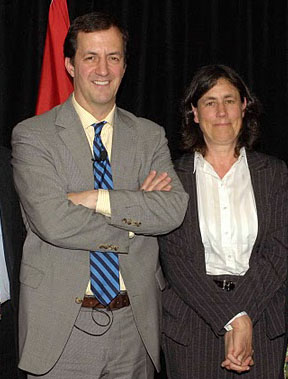 Some Liberals will just shrug their shoulders and point to a new Forum Research poll from this past Monday – which suggests Mr Trudeau’s followers are now “in majority territory.” They have “the support of 41% of Canadians, up five percentage points from November. Tories are at 33% Â support (unchanged from last month), while New Democrats are at 17%, a slight dip.”
Some Liberals will just shrug their shoulders and point to a new Forum Research poll from this past Monday – which suggests Mr Trudeau’s followers are now “in majority territory.” They have “the support of 41% of Canadians, up five percentage points from November. Tories are at 33% Â support (unchanged from last month), while New Democrats are at 17%, a slight dip.”
Yet according to an EKOS Research poll, from this past Monday as well, the “Liberals are at 31.8%, followed by the Tories at 30.8% and NDP at 20%.”
EKOS “also found more Canadians would prefer a Liberal-NDP coalition, led by Trudeau, to a Conservative minority government.” (And see the marvellous patented chart tracing changing popular opinion on this subject since 2009, on the ipolitics site!)
“Not more communism but more public-spirited pigs” ????
So …  Chantal Hébert may very well be right in her current gloomy assessments.
The kind of Liberal-NDP (or NDP-Liberal) co-operation that could most successfully bring an end to what has now become the long right-wing reign of Stephen Harper in Ottawa is just not very likely to happen in the current real world of Canadian federal politics.
Yet the very uncertainties of contemporary Canadian political culture that Andrew Coyne worries so much about – and our lack of consensus on the parliamentary democratic rules of the game in the early 21st century – arguably point to weaknesses in our present federal political system, that will not long survive the kind of abject partisanship all three major parties are wallowing in right now. (For whatever all too understandable reasons!)
This is especially distressing because so many mere Liberal and New Democrat voters do seem to believe that some incarnation of a progressive majority coalition could provide just the kind of stable government which various doctors are prescribing for the Canadian confederation of 1867 in our time.
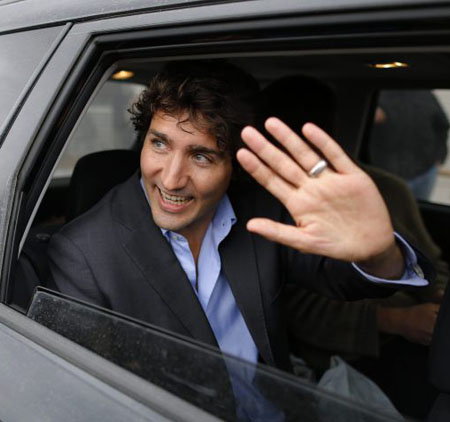
Liberal leader Justin Trudeau – the new M le Canada, and his BC mother’s son : from coast to coast to coast ??
What we need now, of course, of course, of course, are more high-minded politicians, who are more worried about the future of our remarkable country, with all its vast free and democratic potential, than they are about their own political careers.
(Or as T.S. Eliot now famously quipped about the solution to the dilemmas of Animal Farm that George Orwell allegedly missed : what is finally needed is “not more communism but more public-spirited pigs.”)
I am always impressed myself by just how many such politicians I bump into in my ordinary life. I suppose I and the many other mere voters like me can only hope and pray that enough of them get elected to the Canadian House of Commons in 2015.
